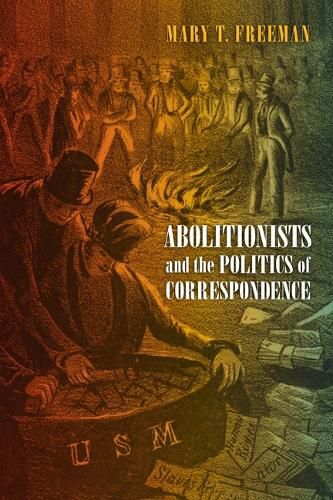Readings Newsletter
Become a Readings Member to make your shopping experience even easier.
Sign in or sign up for free!
You’re not far away from qualifying for FREE standard shipping within Australia
You’ve qualified for FREE standard shipping within Australia
The cart is loading…






Argues that letter writing enabled a disparate and politically marginal assortment of abolitionists to take shape as a mass movement
Abolitionists and the Politics of Correspondence examines how opponents of slavery harnessed the power of letter writing to further their political aims, arguing that this practice enabled a disparate and politically marginal assortment of people to take shape as a coherent and powerful movement.
Mary T. Freeman fuses a political and social study of abolitionists with a focus on letter writing and epistolary culture. Through the analysis of correspondence, Freeman portrays abolitionism as a mass movement, made up of participants from a wide range of backgrounds, and she emphasizes the diversity of the movement's geography, membership, and political activities. The book highlights everyday Americans' involvement in abolition, shifting focus away from the affluent and publicly prominent white leadership. It pays particular attention to those who used letters to intervene in politics when other avenues were closed to them, especially women and Black Americans.
Freeman expands scholarly understandings of abolitionism by showing how letters enabled activists to transmit information and ideas across long distances in a relatively secure format and how they connected people who otherwise would remain strangers. Correspondence also provided a means of political expression to people on the political fringes and disfranchised persons. Even antislavery leaders and those whose social positions were seemingly secure often used the semi-private medium of correspondence strategically. Letter writers could hone their ideas beyond the purview of public audiences, or, when private letters became public, cultural norms granted their contents a stamp of authenticity and directness. Abolitionists and the Politics of Correspondence concerns not just what people wrote about but also how they wrote about it: how they manipulated, exploited, and subverted cultural conventions to make political statements and claims.
$9.00 standard shipping within Australia
FREE standard shipping within Australia for orders over $100.00
Express & International shipping calculated at checkout
Stock availability can be subject to change without notice. We recommend calling the shop or contacting our online team to check availability of low stock items. Please see our Shopping Online page for more details.
Argues that letter writing enabled a disparate and politically marginal assortment of abolitionists to take shape as a mass movement
Abolitionists and the Politics of Correspondence examines how opponents of slavery harnessed the power of letter writing to further their political aims, arguing that this practice enabled a disparate and politically marginal assortment of people to take shape as a coherent and powerful movement.
Mary T. Freeman fuses a political and social study of abolitionists with a focus on letter writing and epistolary culture. Through the analysis of correspondence, Freeman portrays abolitionism as a mass movement, made up of participants from a wide range of backgrounds, and she emphasizes the diversity of the movement's geography, membership, and political activities. The book highlights everyday Americans' involvement in abolition, shifting focus away from the affluent and publicly prominent white leadership. It pays particular attention to those who used letters to intervene in politics when other avenues were closed to them, especially women and Black Americans.
Freeman expands scholarly understandings of abolitionism by showing how letters enabled activists to transmit information and ideas across long distances in a relatively secure format and how they connected people who otherwise would remain strangers. Correspondence also provided a means of political expression to people on the political fringes and disfranchised persons. Even antislavery leaders and those whose social positions were seemingly secure often used the semi-private medium of correspondence strategically. Letter writers could hone their ideas beyond the purview of public audiences, or, when private letters became public, cultural norms granted their contents a stamp of authenticity and directness. Abolitionists and the Politics of Correspondence concerns not just what people wrote about but also how they wrote about it: how they manipulated, exploited, and subverted cultural conventions to make political statements and claims.